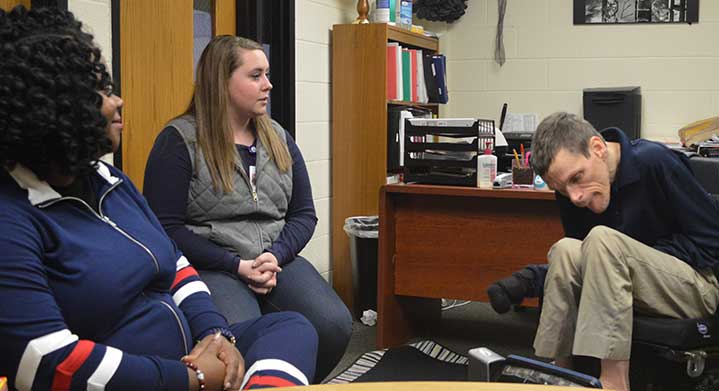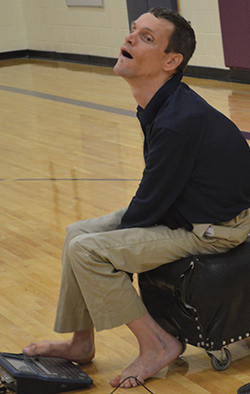Dutton Elementary School second-grader Daniel Donaldson uses pictures and words on his talker to say what he needs to say. “The device gives me the chance to participate with the rest of the class and share the things I’m doing over the weekend,” he said on his talker. “I enjoy that a lot.”
Daniel, who had prepared answers to interview questions, showed how he uses his augmentative and alternative communication device, called an Accent 1000 talker, on which he can answer questions and offer thoughts and opinions. Daniel, who has cerebral palsy, is non-verbal. “It has been powerful for people to hear his voice and the things he wants to say,” said his mom, Christina Donaldson.
AAC includes methods used to supplement or replace speech or writing for people who can’t speak or write. At Caledonia Public Schools, about a dozen students use it. Several, including Daniel, heard Chris Klein — who uses a talker with his toes — tell of the impact it has had on his life.

The Power of Communication
Klein spoke on his own talker to Dutton Elementary students, parents and community members. In the automated voice the device uses, Klein told them he first began using the technology as a 6-year-old. Before that, nobody knew his mental capabilities because he cannot talk. “Do you understand how frustrating it is to not be able to express yourself?” he asked them.

His speech pathologist gave him the talker, which he said opened a new world for him. Klein has cerebral palsy and continually shakes because of lack of muscle control.
“By the next day I was talking in complete sentences. …This technology changed my life, he said. “Augmentative communication gives a person like myself a chance to be educated. It gives a person a chance to have relationships. It gives a person a chance to have a meaningful life because it gives them a tool to communicate.”
Klein was mainstreamed into a regular classroom in third grade. He is a graduate of Hope College and studied at Western Theological Seminary. He has operated an assistive technology not-for-profit resource called Clay Vessel and started a mentorship program for people who use AAC, called BeCOME AAC.
“When you have communication, you can navigate your way through the system and you can almost be anything you want to be,” he said. “It isn’t easy, but it’s possible.”
As a public speaker, he said he feels it’s important to talk with children.
“I believe we have to start with this younger generation, not only talking about disabilities, but talking about how everybody has something they have to overcome.”

Parents Trained Too
Occupational therapist Kim Pyper said the district has a support team of speech pathologists and occupational therapists that work with parents and students who use AAC, and that’s a reason Donaldson chose Caledonia Public Schools.
The team helps train staff and families, fix and program devices, and ensure students have what they need as they go from grade to grade.
“We really wanted to provide a support system that would follow kids from one building tothe next, on into adulthood,” Pyper said.
“They train me to properly program his device, which is huge,” Donaldson said. Daniel, who started using the device last school year, is learning to use it more and more. “This device can grow with him until college,” she said.
Using his talker, Daniel said he loves playing basketball during physical education, wants to be a leader and loves spending time with his friends.
“I enjoy going to the sensory room with my friend, Bobby,” he said. “I like using my classroom tablet and being around my friends: Grant, Eddie, Allen, Katie and others.”
He added special praise for Principal Shawn Veitch, as he typed this out on his talker: “And of course, everybody loves Mr. Veech.”
CONNECT









